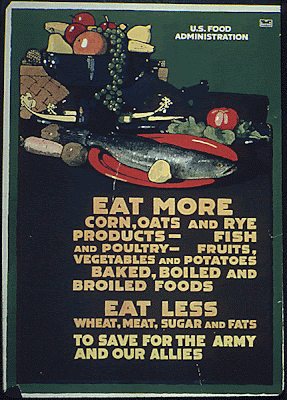A very controversial act was passed in 1917. It was called the Lever Act, named after the man who sponsored it, Rep. Asbury F. Lever of South Carolina. President Woodrow Wilson urged its passing stating it was necessary as a wartime emergency measure. It was officially called "An Act to Provide Further for the National Security and Defense by Encouraging the Production, Conserving the Supply, and Controlling the Distribution of Food Products and Fuel", and it became law on August 10, 1917.
One of the major complaints about the Act as that it empowered the President to limit or even prohibit the use of crops in the production of alcoholic beverages. When passed it did, in fact, prohibit the production of "distilled spirits" from produce that could be used as food.
The Act had to be implemented as it did not impact the American public in itself. The United States Food Administration was created, which replaced the existing volunteer organization. Each state was responsible for assuring that the supplies of food during the war were distributed and that conservation measures were taken. Voluntary agreements were sought. The Administration had two subsidiaries: the U.S. Grain Corporation, and the U.S. Sugar Equalization Board.
Another issue was to prevent monopolies and hoarding. In August of 1919, the President asked Congress to extend the act so that increases in the prices of commodities could be addressed, and also he asked for amendments that would include clothing and set penalties for any profiteering. In October of that year the extension was granted, and the next two months saw the DOJ launching 179 prosecutions.
 |
| The good old days, before GMO corn and other crops. |
Herbert Hoover lobbied for the job of administrator, convincing President Wilson that an individual should run it and not a board. He accepted the position and refused any salary, feeling it would make his moral conviction stronger when asking the public to sacrifice to support the war effort. His goal was to lead people back to a simpler life, especially simpler food.
Homeowners were urged to sign pledge cards that testified to their efforts. The government boards, which included the Fuel Administration and the War Industries Board, began promoting wheatless Mondays and Wednesdays, meatless Tuesdays, porkless Tuesdays and Saturdays, and sweetless Saturdays. Victory gardens were encouraged and planted with slogans like "By all means, save the beans". Children were organized into the U.S. School Garden Army.
Compliance in all programs was voluntary. However, the baking industry, which included restaurants and hotels, were limited to producing "Victory Bread" which was originally made with 5% grains other than wheat. This was eventually raised to 20%.
The Fuel Administration was led by Harry Garfield and its goal was to save coal. The federal government had complete control over the coal industry, but had much less authority over oil and natural gas. It had no authority to control the prices of oil and natural gas. The public was encouraged to save fuel with gasless Sundays, heatless Mondays, and lightless nights.
The Fuel Administration was ended in May of 1919. The Food Administration declined after the armistice, but had effectively disappeared by July of 1920. The amended Act was officially repealed on March 3, 1921.
A lot of these measures seem like they should be repeated in light of living a cleaner, simpler, and much healthier life. We could certainly use less monopolies, but having today's Congress set penalties for monopolies and profiteering? Hardly possible, but we can always dream. After all, there is a precedent for it, and it worked...
***************
Images from Wikimedia Commons.
To see about a current exhibition on the government's
effects on the American diet, click here.
*******************************














No comments:
Post a Comment
NOTE: COMMENTS WITH LINKS WILL NOT BE POSTED!